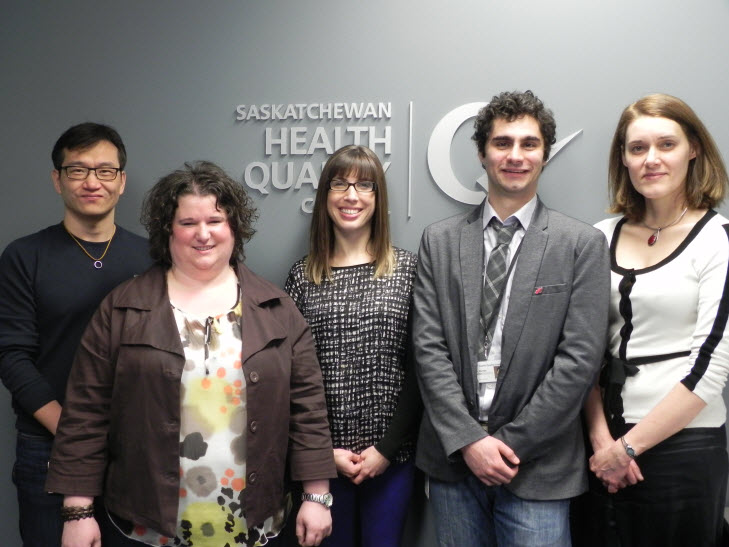The Health Quality Council (HQC) was recently selected to make a presentation at a highly regarded international conference for professionals using SAS statistical software.
HQC researcher Meric Osman gave a talk at the SAS Global Forum 2015, which was held in Dallas, Texas, from April 26 to April 29. The annual conference describes itself as “the premier worldwide event for SAS professionals” and gives attendees the opportunity to “connect with the best and brightest SAS experts from around the world.”
“It was exciting,” said Osman of making the presentation.
“SAS statistical software is used in a wide variety of industries, and HQC has expertise in using it in health care. We welcomed the opportunity to share our knowledge with other experts and innovators from around the world, as well as learn from them.”
Osman’s presentation was based on a research paper he wrote with some of his HQC colleagues: senior researcher Jacqueline Quail, research analyst Nianping Hu, and senior analyst Nedeene Hudema. The research team submitted an abstract to the SAS Global Forum, and then HQC was selected to present at the conference. The research paper outlines how HQC is using SAS software to create episodes of hospitalization for health services research.
“An essential part of health services research is describing the use and sequencing of a variety of health services. One of the most frequently examined health services is hospitalizations. A common problem in describing hospitalizations is that a patient may have multiple hospitalizations to treat the same health problem,” said Osman.
An example is that a patient may be sent to and returned from another facility in a single day for testing, transferred from one hospital to another, and/or discharged home and then readmitted within 24 hours.
“In all cases, these hospitalizations are treating the same underlying health problem and should be considered as a single episode. If examined without regard for the episode, a patient would be identified as having four hospitalizations. In reality, they had one hospitalization spanning multiple facilities,” he said.
“Failing to account for multiple hospitalizations in the same episode has implications for many disciplines, including health services research, health services planning, and quality improvement for patient safety.”
Quail said SAS software is an integral tool used by HQC’s Measurement and Analysis Services (MAS) team.
“It’s harder to learn than other statistical software programs, but it is able to easily handle the millions of data observations we pull from health care administrative databases to answer research questions,” she said.
Osman said it’s important to have “strong data” to inform health care policy, and SAS software is crucial in HQC’s analytical work.
“Wrong research conclusions can be drawn from even the best-quality data if the right methodologies aren’t used,” he said.
Osman said presenting at the SAS Global Forum was beneficial for HQC. The conference, which was attended by nearly 5,000 people, provided an opportunity to share HQC’s knowledge with a wide audience as well as to learn from other experts. For example, Osman learned a lot about “efficient and automated report creation using SAS” – something that he plans to share with his HQC colleagues.
“As HQC gets more and more involved in research partnerships with external organizations, this will have a significant impact on our day-to-day work,” he said.
The HQC research paper, entitled “Using SAS to Create Episodes-of-Hospitalization for Health Services Research,” can be viewed online at http://support.sas.com/resources/papers/proceedings15/3281-2015.pdf.
“After the conference, our paper was posted online with free access, further increasing HQC’s visibility and reputation as an organization skilled in using SAS to conduct high-quality health research,” said Quail.
“HQC’s work has become freely available to others to use and improve upon. We are hoping that others use the method we have developed and share their improvements to the method with us. It’s a way of getting advice from thousands of experts from around the world,” added Tracey Sherin, HQC’s director of analysis and research partnerships.
“Attending the conference allows our researchers and analysts to learn new SAS methods and procedures from experts from around the world. They can bring their new knowledge back and apply it to the work they do every day at HQC,” she said.
“The databases we work with are large and complex; there is enormous potential to conduct innovative research that will contribute to improving health care in Saskatchewan. To be able to do that, it is important to be continuously developing and improving our skills.”
Photo: From left: Research analyst Nianping Hu, senior analyst Nedeene Hudema, director of analysis and research partnerships Tracey Sherin, researcher Meric Osman, and senior researcher Jacqueline Quail



